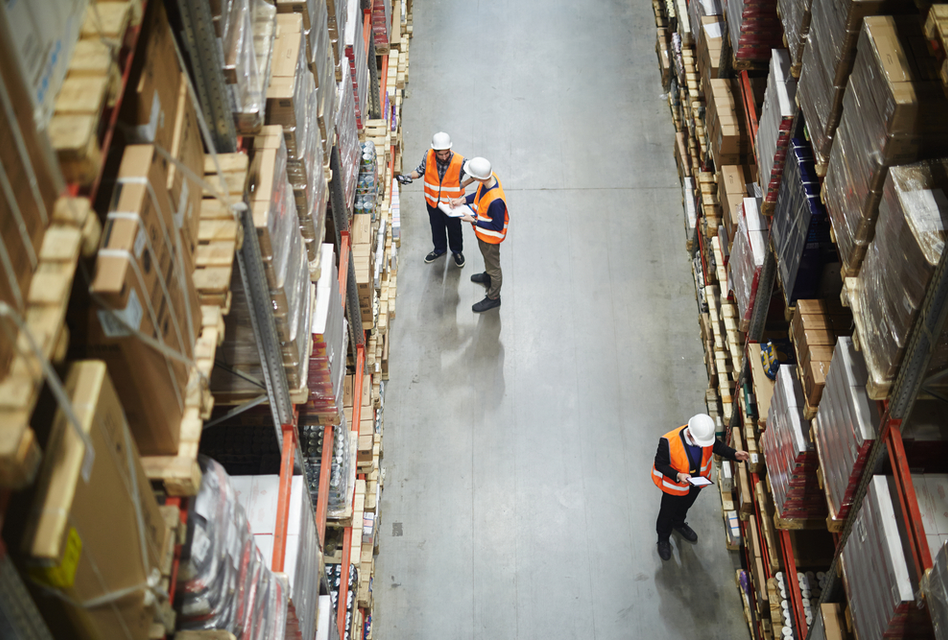The Council of Supply Chain Management defines logistics management as:
“…that part of supply chain management that plans, implements and controls the efficient, effective forward and reverse flow and storage of goods, services and related information between the point of origin and the point of consumption in order to meet customers’ requirements.”
By looking at The Council of Supply Chain Management’s definition, logistics management is described as the act of streamlining the shipment and storage of goods or services in the most efficient and accurate manner. Given the complexity of logistics paired with supply chain management, speed and accuracy can be exceptionally difficult to manage.
Current logistics procedures, being mainly paper-based, are prone to human error and a lack of communication, which in turn leads to confusion in the supply chain. This can cause a considerable slowdown when processing forms, ultimately resulting in prolonged shipping times.
The use of blockchain for logistics is thought by many to be the next step in increasing the efficiency of logistics management. The key component of blockchain technology, a distributed ledger with its ability to perform actions autonomously, makes it a valuable tool for increasing logistics efficiency.
The Problems of Current Logistics Procedures
Consider the extensive amount of data that goes into current logistics practices. Times, routes, shipping contents, fuel, warehouse contents, warehouse size, etc. — it is a never-ending list of information, which only becomes more convoluted as goods move throughout the supply chain.
As businesses expand into the global market, this data expands even further. This requires logistic managers to manage multiple supply chains, a task which seems practically impossible to conduct if it’s paper-based.
And it does not stop there. If the differing regulations between regions are brought in to the mix, the difficulty of managing logistics increases even further. According to a report released by the consulting firm PwC,
“Customer expectations are increasing greatly. Both individuals and businesses expect to get goods faster, more flexibly, and — in the case of consumers — at low or no delivery cost.”
In order to fulfil this duty, logistics management is in need of a complete overhaul. Utilizing blockchain for logistics may be the appropriate solution.
Why Blockchain?
Blockchain technology began as a platform on which cryptocurrencies function. Utilizing a set of complex algorithms, it provides the security required to transfer digital assets in an anonymous manner while keeping a log of all transactions conducted.
Although developed as the basis for bitcoin, blockchain technology and its use of an immutable distributed ledger, is beginning to find adoption throughout various sectors.
- By using a distributed ledger, all members of a blockchain have access to the same information.
- Additional information (or blocks) can be added and original information altered only with the consensus of the majority of a blockchain’s members.
- Using the same methods utilized for the protection of cryptocurrencies, blockchain is extremely secure. It uses a variety of complex algorithms to encrypt information shared between parties.
- Blockchains can handle extensive amounts of data while ensuring legitimacy and security.
- Through the use of smart contracts, actions can be performed autonomously when certain conditions are met.
It is for these reasons that blockchain technology is being researched by multiple organizations such as IBM, Oracle, Alibaba, Amazon, Facebook, various banking institutions, and many other businesses hoping that it will enhance the efficiency of their logistics and supply chain management.
How Blockchain Improves Logistics Efficiency
As the global economy continues to grow, paper-based modes of logistics management will eventually become too complex to manage. These methods are prone to human error and require a substantial amount of paper, resulting in exorbitant costs. Paper-based transactions can also require a substantial amount of time to process, resulting in delays.
By utilizing blockchain, logistics can be easily simplified by sharing a distributed ledger between points of the supply chain:
- At each point, information can be updated and goods can be tracked in real time.
- With access to the blockchain, separate points in the chain will be able to identify where current goods are, what condition they are in, and how large the shipment of goods actually is.
- With this information, space can be made in warehouses to accept shipments, transportation vehicles can be reserved, and digital smart contracts can be created in preparation for the arrival of goods.
A distributed ledger simply puts all points of the supply chain on the same page. It allows shipments to be tracked in real time. Also, with the use of tags in conjunction with IoT technology, it becomes possible to track each component of a shipment. Blockchain logistics can essentially contribute to transparent and trackable communication between the parties involved. In its turn, this results in decreased cost, as current logistics practices currently rely on third-party companies for transportation and storage.
Using Smart Contracts to Automate Payments
Smart contracts can increase logistics efficiency even further. Smart contracts can be written into blockchains to automate certain functions. They basically follow the “if A then B” formula to carry out automated tasks. This aspect of blockchain can be used to automate payment services.
Digital wallets can be established on a blockchain too, which can automatically distribute or receive funds issued through a smart contract. So, once a shipment reaches certain points in a supply chain, payments can be made automatically rather than relying on current payment systems which can cause long processing times.
Current Blockchain Implementations and Their Future in Logistics
- Global technology company Ideanomics in conjunction with the Asia-Pacific Economic Cooperation Co. (APMEN) are currently working to implement blockchain in their logistics systems for port clearance.
- Shanghai and Guangdong are two of the busiest ports in the world with the total value of imports and exports estimated to value around $1.5 trillion annually. Giving clearance to ships utilizing these ports can be time-consuming processes as information between the two is not shared. The eventual goal is to streamline these processes by utilizing a blockchain that can be accessed by all ports within the area to ensure the legitimacy of any ships entering or exiting ports. Traditionally conducted through paper-based procedures, for this use case, blockchain will help in decreasing time and cost surrounding the logistics of port clearance.
- A study by the World Economic Forum shows that streamlining information through blockchain has the potential ability to increase trade by up to 15%. Given the dramatic increase and blockchain’s potential uses in logistics, IBM and shipping company Maersk have formed TradeLens, a company intended to commercialize blockchain technology. IBM is the leader in global technology and Maersk is the world’s largest container shipping company. Their interest in blockchain shows that it could have revolutionary effects for logistics in any industry.
The overall idea is to simplify global trade through the use of blockchain technology to cut cost, expedite shipping times, and improve logistics and supply chain management on a global scale.
You may also like:
➔ Blockchain in Logistics: 10 Real-Life Use Cases
Replacing Outdated Logistics Procedures with Blockchain
The word ‘blockchain’ is entering the mainstream more and more each day as industries are realizing its uses for logistics, supply chain management, payment processing, and much more. Paired with other developing technologies such as IoT, blockchain can be eventually utilized by businesses and consumers alike to improve daily life.
As shown above, it is making waves in logistics and is set to streamline an aspect of business that has utilized outdated systems for far too long. The benefits of blockchain in logistics are already being discovered. Blockchain-based shipping logistics will most likely be adopted within the next few years. Companies like IBM and Maersk have developed new businesses based only on the possibilities of blockchain. Given what the technology has achieved so far, as blockchain use continues to expand in the future, it is a technology that is sure not to disappoint.





Blockchain Insights
Join our mailing list to receive OpenLedger Insights publications weekly.
Thanks! Please check your inbox to verify your email address.
By clicking “Subscribe”, you’re accepting to receive newsletter emails from OpenLedger Insights every week. You can easily update your email or unsubscribe from our mailing list at any time. You can find more details in our Privacy Policy.